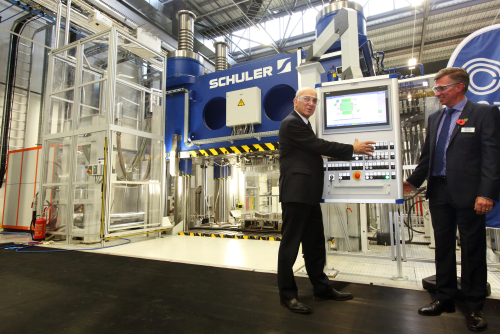
Video: Peter Chivers, Chief Executive of the NCC, talks about the centre's capabilities.
Dr Cable was joined by more than 400 guests to see the new facilities, which were funded by a £28 million investment from BIS, via InnovateUK and the High Value Manufacturing Catapult.
The NCC officially opened in 2011, a £25 million investment as part of the government’s UK Composites Strategy. It aims to bring together industry and academia to develop technologies for the manufacture of high-quality composite products.The open-access facility is available to all UK-based companies on a pay-per-use basis or via a membership scheme.
“The National Composites Centre is leading the way in developing composites, the advanced materials which are crucial to Britain's aerospace and automotive industries amongst others," Dr Cable said.
"Britain is historically very good at making scientific discoveries but not turning these ideas into businesses. The NCC is part of the network of Catapult Centres across the country that is helping us to do just that – providing skilled jobs and a stronger economy.”
As part of the Building the Future for Composites event, a racing yacht, lightweight road cars and the largest openly-accessible high rate manufacturing press for composites in Europe were on show to highlight the NCC's capabilities.
The new press is already in action, reports Peter Chivers, NCC Chief Executive.
"This is aimed at supporting sectors such as automotive, where developing high rate, low cost manufacture of composite components is critical. This press is only in its first week of factory trials, yet it is already producing parts within just 6 minutes.”
“In order to develop and optimise a full factory process, further HVM Catapult Core funds will be utilised for key investments in automated preforming technology and automated part and tool handling," he added.
2014 strategy
The Composites Leadership Forum (CLF), formed in 2011 as the voice of 'composites-using industries', provided an initial brief of the 2014 UK Composites Strategy.
"This has been developed through extensive review and analysis of the future global composite market, the current UK capability and the actions required to grasp the opportunities," reported Alison Starr, Chair of CLF.
"The work has been undertaken in consultation with industry, academia and government. The strategy identifies three types of support needed to sustain and grow the UK composites industry: ‘Protect’ and accelerate growth in established sectors; ‘Progress’ and develop technology and supply chains for mid to high volume manufacturing; and finally ‘Position’ the industry to enable emerging sectors to make a paradigm shift to capture the opportunity.”



